I know this post will upset some of you. I don’t write from a position of wishful thinking, but rather, from one of experience. I can deal with hurt feelings, but the grief of a parent, visiting the graveside of their child, because they didn’t know…
I am a recovering addict of 18 years, who works in the field of addiction. I’ve sat with hundreds of addicts and their families, and one thing is VERY clear.
Addiction needs help to progress and thrive. Without it – it can’t reach its full potential.
I’ve spent many years banging my head against the wall, when it comes to educating the addict’s family. Sitting in group with their loved ones I see, what they don’t. Their son or daughter or spouse, boasting about manipulating their family. The addict is given feedback and forced to look at the impact their addiction has had. They don’t always like it. Some will phone their family and complain about the rules, or say treatment is a waste of time and money, or that someone isn’t treating them right. The addict wants to leave treatment, when the going gets rough. The easier softer road, is so much more appealing. To leave treatment, they often need help. They need a place to go, money or a ride to get there, etc. The family, who only a short time ago was begging to get the addicted person into treatment, takes them out!
Just recently a woman came to get her son. He talked openly in group the day before, about playing his Mom. I told her this, but she didn’t believe me. She said she knew what her son needed, better than anyone else. I begged her not to take him with her. He wasn’t ready and he wouldn’t make it. I told her he would use. She said he’d promised her, he wouldn’t. I reminded her that his words and actions weren’t matching up. He was promising not to use and walking out of treatment. His actions matched those of a relapse, not one of sobriety. Within 48 hours this young man died from an OD of heroin. His Mom found him and my heart breaks for her.
Almost always when the family stops enabling, the addict is forced to grow up and take responsibility. I believe we’re treating addiction wrong. I don’t think we should treat the addict first. They’d have a far better chance, if we started with their family and then brought them into treatment.
This is why I write. I’m passionate about helping addicts and their families overcome the obstacles of addiction. I write from personal and clinical, experience. I write, because addicts are dying and their families are suffering.
But mostly, I write because I’m telling… on addiction.
Sincerely, Lorelie Rozzano.
I Love You To DEATH.
It never fails to amaze me – how sick the addict’s family members, become. If you didn’t know about addiction, you might think it was the person sticking needles in their arm, or drinking themselves to death, who had the problem.
But strangely enough, when you look behind the scenes at the world of addiction, the addict might be the least ‘sick’ of the bunch.
Addiction requires an enabling system (yes, I know I sound like a parrot, but maybe if I say it enough times, enabling, enabling, enabling, the word might stick)
Family members tell me, “I don’t want to upset them” That’s code for, “I don’t want to feel upset”
No more excuses people! Let’s just say it like it is. Enabling is a selfish, self-serving, behavior. It’s not about ‘helping’ the sick person, get well. It’s about you avoiding confrontation, or feeling uncomfortable.
Enabling is also a form of using. When you say ‘yes’ you experience a rush. Instant gratification, (euphoria) for long term misery.
Enablers focus on the addict, to the exclusion of everyone else.They like being in control and feel pleasure from ‘helping.’
The enabler’s illness progresses alongside the addicts, going through similar phases.
Phase One:
Enabler is upset about loved one’s behaviour. They set rules and boundaries threatening to leave, (or ask your adult child to leave) if the alcoholic/addict repeats the behaviour.
Phase Two:
Addict/Alcoholic repeats the behaviour. Enabler, rants at addict/alcoholic, stating they are ‘ruining their life.” Enabler warns, if you do it again I’ll leave or you’ll be kicked out, for sure!
Phase Three:
Addict/Alcoholic repeats the behaviour. Enabler doesn’t leave, or kick them out. Rather they grow more bitter and resentful over time, living in what they once said, they would not. They’re obsessed with addict/alcoholic to the cost of all other relationships. Their emotional well being is firmly entrenched with the addict. If the addict is okay, they are too. By this time the enabler is defending the abusive, dishonest, and manipulative behaviour exhibited by the ‘sick’ one.
Enablers adopt the same essential symptoms as the addict. It becomes habitual for them to minimize, justify, rationalize, deflect, avoid, isolate, blame, excuse and tolerate, abusive behaviour. They practice denial and are often in self-pity, continuing the endless cycle of delusional attempts at ‘helping.’
Both enabler and addict have lost the ability to be honest, or see themselves with any clarity. Both will be angered when confronted on their behaviour.
Some enablers may spend their whole lives waiting for the ‘sick’ person, to change.
Enablers experience weight loss/gain, high blood pressure, ulcers, headaches, migraines, insomnia, depression, heart disease and stroke. Many enablers will become workaholics, shopaholics, or develop a relationship with prescription medications, or alcohol, themselves.
Enablers to put it bluntly, love their addict – to death.
Lorelie Rozzano.
www.jaggedlittleedges.com
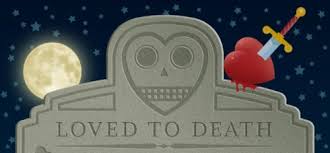
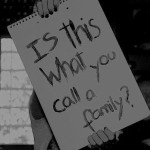

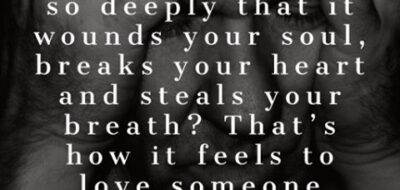
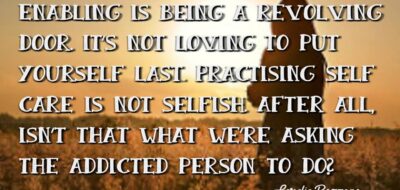
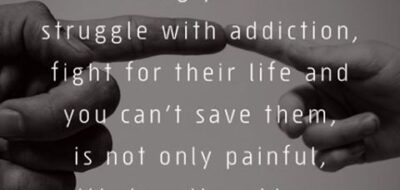
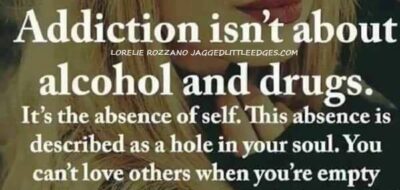
Jill
You make it sound too simple. Im not an enabler but my 14 yr old addict can find many other people who are. She tells people she has no-where to stay and they let her stay. They give her food, shelter and drugs. They hide her from police. I report her to police and child protection. Its not always the family who are the enablers.
Lorelie
You’re right Jill, there are many others out there who are willing to enable our addicted loved ones including the system we live in today. No easy answers for sure!
Natalie
I love my brother Dec.28 @ age 24. Myself an addict I wish I had done ssomething, anything, now he is gone amd I want to recover but it feels like what’s the point -the apathy you talked about. I’ve lived in addiction since before birth and it is rampant on both sidea of my family. I want ao bad to go back and make everything better -treat the addiction so my brother wouldnt have to face it. I hope my grief will take me down the right path to recovery. I am praying no one has to feel the pain or guilt I do every day. Help me to help myself make the right choices.
Lorelie
Hi Natalie,
I am so sorry for your loss. My advice to you is to live the best life you can in honour of your brother. Make every right choice, that he wasn’t able to. Succeed where he failed and ultimately, he will have succeeded – through you. Please don’t let addiction steal another soul. Fight back and create something lasting in your brothers name. Hugs.
Sally
This is so true!!!
Shannon Hall
Their are tons of people who would disagree with the family’s being sicker then the addict. I know that from experience my addiction was formed early in my childhood not because I had a bad mother but because my mom did what she learned from her childhood. I think that its important for people to understand that children learn the most before they can even talk just by example.
Jean Short
I’d love to see this book beside every till in every store. Perhaps more people would be tempted to pull their head out of the sand.
Debra
Thank you so much for the post I love you to death. It really hit home with me. I’ve been down that road and I stayed on that road for many years I was the enabler. I shared your post in hopes that others will read it and it will give them the courage to stop being the enabler. I believe you when you say the enablers have to be cured first! I wish you much success in your addiction treatment for others now . thank you so much For speaking the blunt truth of the matter!